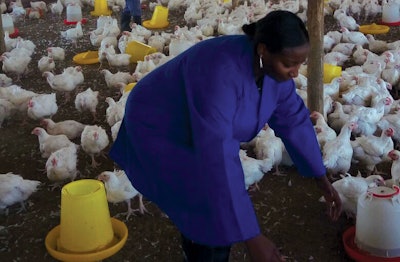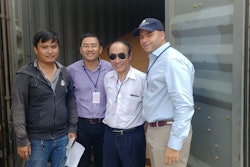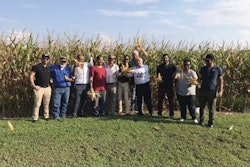

Mwakajila started a poultry farm with her husband in 2012 in Arusha, Tanzania, with 500 layer chickens. In 2014, she switched to broilers and started contract farming with a local integrated company, producing 6,000 layers per month. It was not until 2016, however, when her marketing plan kicked into high gear.
In September 2016, the Council sponsored Mwakajila’s training at the Kwazulu-Natal Poultry Institute (KZNPI) outside of Durban, South Africa. Upon returning from training at KZNPI and with the guidance and support of the Council’s local staff and consultants, she returned to Tanzania to end her contract and undertake marketing her own chicken to local supermarkets and hotels.
“The Council gave me knowledge, which is the best gift,” Mwakajila said. “They gave me a story which I can continue to share with my fellow producers.”
Since the start of 2017, Mwakajila has increased production from 24,000 broilers per month to 40,000 broilers per month. She sells her frozen chicken under her own brand of Tanzanite Chicken to a dozen supermarkets, hotels and restaurants around Arusha, taking orders on average of 1,000 chickens per week.
Building a poultry industry
Mwakajila is one of more than 1,000 Tanzanian poultry producers the Council has trained in farm management and business practices as part of a Food for Progress (FFP) program. The Council launched the Tanzania program in spring 2014, fully funded by a grant from the U.S. Department of Agriculture’s Foreign Agricultural Service (USDA’s FAS), to promote the development and professionalization of the country’s commercial poultry and feed sectors.
The program’s goal is to sustainably enhance the capacity of the commercial poultry and feed milling industries in Tanzania. Upon returning to Tanzania from KZNPI training programs, 98% of participants have applied improved techniques to their production practices. In addition, as the combined result of the whole USGC program, 522 poultry producers now purchase only quality feed for their operations, decreasing the average feed conversion ratio of program participants from 2.7 to 2.35:1.
Bulla Hekeno, another of the participants in the Council’s training programs, has also seen great success in growing her farm from a small-scale farmer in late 2012 to a brand of frozen chicken products.
“In 2016, I had the opportunity to go for training with the Council,” Hekeno said. “After the training is when I got the idea to expand and try to get my brand out there in the market, which is what I started working from the time I came from the training up until now. I sell to supermarkets, restaurants, households, caterers and butchers.”
Hekeno now owns her own processing facility where she processes an average of 150 to 200 chickens per day in addition to a cold storage facility for her frozen chicken products.
As Hekeno’s business continues to expand, she cannot produce enough chickens at her own farm to supply her demand. As a result, she has expanded her operations to having other farmers produce chickens for her under contract.
Costa Mrema is one of those farmers as well as another participant in the Council’s training programs.
“I was introduced to a more advanced training to travel to South Africa, and that has made a complete difference in the way I do poultry,” Mrema said. “I can assure you, I will be involved in the poultry industry as long as I live, and no turning back as a result of USGC training.”
Turning training into action
Mrema also represents another important component of the Council’s work in Tanzania — developing effective, self-sustaining and professional national poultry and feed associations to strengthen the local commercial poultry and feed industry through training and mentoring initiatives, similar to the Council’s successful work in other countries.
Mrema is now the chairman of the developing Tanzania Broiler Farmers Association, which the Council is helping organize.
“The Association is very important because farmers come together and they exchange ideas on farmer methods,” Mrema said. “I see and visualize a bright future for my business because this business is here to stay forever as long as I live.”
These growing Tanzanian poultry and animal feed industries flexed their burgeoning strength, combined with the Council’s efforts, in summer 2017 when the groups collectively pushed to remove a cost prohibitive value-added tax on the sale of animal feed.
Feed accounts for as much as 70 to 80% of poultry production costs in Tanzania. Yet corn prices in Tanzania are currently more than double the average cost due to restrictive import regulations, inadequate infrastructure and resulting limited corn imports. Adding to this high input cost, the Tanzanian government instituted the 18% value-added tax on animal feed sales in July 2016.
The cumulative fiscal strain hit the local feed manufacturing industry, resulting in many millers going out of business temporarily or leaving the market permanently. Subsequently, poultry producers also halted production as the high costs and stagnant market price made profitable business impossible.
Since its inception, the Poultry Association of Tanzania (PAT) and its members, including the Tanzanian Animal Feed Manufacturers Association (TAFMA), have lobbied the government to remove the tax. The groups, supported by the Council, argued the tax was counterproductive to the growth of the domestic poultry and animal feed industries in Tanzania.
The removal of the tax on animal feed as of June 2017 allows for some poultry producers and feed millers to re-enter the market and compete in this growing industry. The removal of the tax is a huge relief to the industry at a time when the feed industry was already struggling with a severe regional drought that drove up the price of raw materials. In addition, the removal of the tax will ultimately benefit Tanzanian consumers by lowering the cost of poultry and eggs.
The associations’ success in working as a team to have the government remove this extremely restrictive tax further shows the impact organized local action can have on the ground for a growing feed industry.
Focusing on quality in 2018
An extension of the funding for the work in Tanzania through 2018 allows for new focus on the final piece of the program — finishing the development of a central veterinary laboratory as a self-sustaining feed quality lab that feed millers use to test the quality of feed and feed ingredients, bolstered by effective feed industry marketing programs to teach poultry producers about the advantages of quality feed.
Staff from the lab traveled to South Africa in 2017 for training in feed and laboratory management practices, spending time in four feed quality laboratories and experiencing how accredited labs are run.
“The visit changed our mind-set into thinking that application of proper procedures is not a burden or a cumbersome thing to do, but if done correctly will save time cost with the benefit of trustworthy results,” said Leila Robin, one of the lab’s technicians who participated in training. “At the same time, it will become fixed in our minds and become like second nature.”
The Tanzanian staff have already implemented many action items from this training and understand the need for more training on aspects like proper sample taking procedures to ensure quality results.
As a result of the Council’s program, the lab has become an effort the Ministry of Agriculture, Livestock and Fisheries publicizes and presents to every group visiting the Ministry.
实验室工作人员和迷你stry officials now understand and feel the importance of maintaining the lab’s quality and reputation within the industry. Making physical updates to the lab, staff training programs and putting new equipment in place were all steps to building up the staff morale and building a strong reputation for the lab as a consistent, reliable feed testing lab for feed millers. Now, the lab must finalize its business plan to help ensure its long-term sustainability.
The positive results from all aspects of the Council’s FFP activities in Tanzania demonstrate how training seminars work as a building block toward helping local feed producers and farmers build successful commercial poultry businesses. A growing industry in turn generates increased consumption of both poultry within Tanzania and demand for the coarse grains — like U.S. corn — needed to feed them. The Council believes through partnering with local industry and developing markets through trade, we can improve lives for both U.S. farmers and our customers, like those in Tanzania.





















